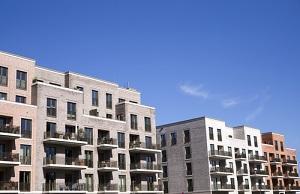Connecticut Supreme Court to Decide If Fourth Amendment Applies Differently to Apartment Dwellers
 In 2013, the United States Supreme Court issued a ruling in Florida v. Jardines, a case that involved the presence of a drug-sniffing dog on the porch of a suspect’s home without a warrant. The dog’s behavior on the porch and around the home suggested to law enforcement officers that there were illegal drugs inside the home. Based on the dog’s alert, the police obtained a warrant, searched the home, and arrested the suspect for marijuana trafficking. In a 5-4 decision, the Supreme Court held that the area “immediately surrounding and associated with home is part of the home for Fourth Amendment purposes,” and that the introduction of the drug-sniffing dog with a warrant based on probable cause was a violation of the owner’s Fourth Amendment rights.
In 2013, the United States Supreme Court issued a ruling in Florida v. Jardines, a case that involved the presence of a drug-sniffing dog on the porch of a suspect’s home without a warrant. The dog’s behavior on the porch and around the home suggested to law enforcement officers that there were illegal drugs inside the home. Based on the dog’s alert, the police obtained a warrant, searched the home, and arrested the suspect for marijuana trafficking. In a 5-4 decision, the Supreme Court held that the area “immediately surrounding and associated with home is part of the home for Fourth Amendment purposes,” and that the introduction of the drug-sniffing dog with a warrant based on probable cause was a violation of the owner’s Fourth Amendment rights.
Precedent for Apartments?
From a practical standpoint, the high court’s ruling in Jardines applies fairly easily to single family dwellings and duplexes that share very little common area. But do the same Fourth Amendment rights apply to those who live in apartments, condos, and other homes with shared hallways and public spaces? In the federal court system, circuits around the country have been divided on the issue, which may be an indication that the U.S. Supreme Court will ultimately need to put the matter to rest. Meanwhile, the Connecticut Supreme Court is expected to rule on a case very similar to Jardines, but that involved a drug-sniffing dog in the common hallway of an apartment building in Hartford County.
Connecticut v. Kono
The case before the Connecticut Supreme Court stems from a 2012 investigation into a suspected marijuana grower. With permission from the building’s owner—and not from its residents—police allowed a drug-sniffing dog to walk the hallways of a multi-unit apartment building, sniffing at the bottom of each door. When the dog alerted his handlers that he had detected drugs at the door of the suspect, police obtained a warrant, searched the residence, and arrested the suspect. The defendant’s attorneys sought to have the evidence seized in the search suppressed as they believed the warrantless sniff by the dog represented a violation of the man’s Fourth Amendment rights. The trial court agreed and dismissed the charges, but the state appealed to the Supreme Court, where the case is currently pending.
Concerns About Double Standards
Applying such rights differently in an apartment building compared to a free-standing suburban home could have serious implications regarding the equal application of justice. Many are concerned that allowing separate privacy standards could have very far-reaching effects that venture well into discriminatory practices. They believe that if the practice of warrantless sniffs is prohibited around a home in the suburbs, the defense maintains, it should not be permitted in apartment buildings either. Allowing it to continue would effectively divide citizens into two classes—based on the type of housing they can afford—whose rights to privacy are unreasonably different.
If you have been accused of a crime based on evidence seized in a search that violates your Fourth Amendment rights, you need a lawyer who will fight for you. Contact an experienced Hartford criminal defense lawyer today to learn more about your options. Call 860-290-8690 and schedule your confidential consultation at the Woolf & Ross Law Firm, LLC.
Sources:
https://www.law.cornell.edu/supremecourt/text/11-564
http://www.alternet.org/drugs/blatant-intrusion-drug-sniffing-dogs-may-be-coming-end
http://bigstory.ap.org/article/c845af7ba04b402aa98d4d6b39dccd0b/was-police-dog-sniff-outside-connecticut-condo-door-legal
http://www.ctlawtribune.com/id=1202753110104/Conn-Court-to-Decide-Whether-DrugSniffing-Dog-Violated-Pot-Growers-Rights






